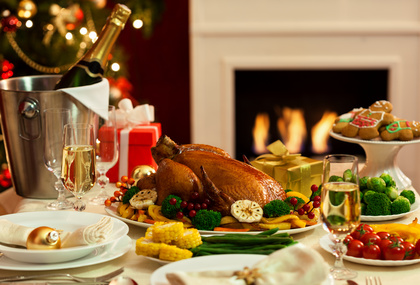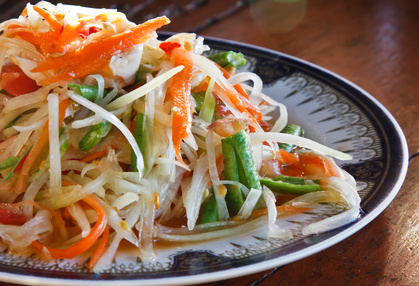And They'd Feast!
Published: Wed, 01/06/16
January 6, 2016
“And They'd Feast! And They'd Feast! And They'd Feast, Feast, Feast, Feast!” Kelly Pomeroy, M.H.
The Holiday hoopla has hit, with packages, presents, cards, caroling and feasts! In the words of Dr. Seuss, “And they'd feast!
 And they'd feast! And they'd feast, feast, feast, feast! They would feast on Who pudding, and rare Who-roast beast.” And with all of that lovely feasting, if we are not
conscious and cautious, there often comes an unwanted case of indigestion. It comes in the form of acid reflux, heart burn, bloating, sour stomach, bad breath and more. We can have the lovely feasts and still be glad we did afterwards, if we have an understanding of how foods affect us and we are willing to exercise a little self-control.
And they'd feast! And they'd feast, feast, feast, feast! They would feast on Who pudding, and rare Who-roast beast.” And with all of that lovely feasting, if we are not
conscious and cautious, there often comes an unwanted case of indigestion. It comes in the form of acid reflux, heart burn, bloating, sour stomach, bad breath and more. We can have the lovely feasts and still be glad we did afterwards, if we have an understanding of how foods affect us and we are willing to exercise a little self-control.Let's take a look at the digestive tract so that we can make better choices for the New Year and also give natural aids for those suffering with “feaster's remorse.”
One of the simplest tasks we underestimate is our chewing. As soon as food enters our body digestive juices are secreted in the mouth in the form of saliva. Saliva mixes with our food and helps to soften, break down and prepare the food for nutrient assimilation in the body. If we bypass thorough chewing, or in the words of Remy from “Ratatouille,” we “hork it down,” it will spend more time in the stomach. This layover is necessary for the stomach to break down the food sufficiently to pass through the rest of the digestive tract. However, this detainment causes the food to sour and ferment, creating excessive acid and gas.
The innermost lining of the stomach has cells that secrete mucous that protects itself from acids that are secreted therein to aid in digestion. It also secretes bicarbonate that aids in neutralizing the acid at proper times. Deeper in the stomach lining are cells that excrete hydrochloric acid that break down food and kill bacteria, pepsin that digests proteins, somatostatin that inhibits the cells from secreting, gastrin that aids in the production and secretion of the hydrochloric acid in the stomach and ECL that stimulates the production of hydrochloric acid. This intricate system is highly efficient, but must be used properly. If misused over time, extreme health problems occur. If misused occasionally, there are aids we can use to help the system.
Nothing is as miserable as a sour stomach or heartburn. I ate some food at a party this season that I was not accustomed to and sure enough the burning sensation came. What can we do when moments like that strike? Because we have overloaded our system, we have created too much acid. While we need acid to break the food down properly, taking an antacid will hinder the digestion and food absorption process. Here are a few ideas that others and myself have tried that work and that support the body's process:
1. Remember to chew your food properly. This can alleviate a lot of problems.
2. Relax at meal time. Set aside stresses and take time to enjoy your food. Hurrying through meals can cause the food to sit for longer periods of time in the stomach.
3. Eat small meals frequently. Small meals allow the body to break down food with greater ease, avoiding too much acid production in the stomach.
4. Try not to drink water with your meals. It dilutes the saliva and keeps it from properly breaking down food in preparation for the stomach.
5. Eat simple foods most of the time such as fresh vegetables and fresh fruits. They are generally less acidic in nature and quickly break down and process through the stomach. Richer foods such as meats, eggs, starches and sweets should be eaten in moderation and in proportion to the amount of work your body does. Meats, dairy, eggs and sweets are acidic by nature. They cause the body to create more acid to break them down. This causes them todigest much slower in the system.
6. Avoid mixing meats with fruits. This combination causes gas and fermentation in the stomach. Fruits break down quickly, but meats do not and so the sugars linger with the meat, causing a souring of the stomach and excess gas.
7. Take Papaya leaves in a capsule or as a tea after you eat. Papaya contains the enzymes papain that digests proteins quickly so that they do not putrefy in the stomach.
8. Eat or take in capsule slippery elm. Slippery elm absorbs gases and toxins, can soothe heartburn and aid the stomach wall in creating a mucilaginous barrier inside the digestive tract. Dr. Christopher has a formula called Soothing Digestion that is a combination of Slippery Elm and Licorice that works great!
9. Catnip and Fennel combination. Catnip relaxes and soothes and fennel eliminates gases. Dr. Christopher has a formula for both adults and children that works great called Catnip and Fennel or Kid-e-Col.
There are many additional ways to combat these discomforts. They can be found at www.herballegacy.com or by enrolling at The School of Natural Healing. You will learn firsthand how to best help you and your loved ones enjoy the feastivities. Cheers to a happy, healthy you and yours this coming New Year!
Kelly Pomeroy is a graduated Master Herbalist, Student Adviser at The School of Natural Healing, and Mother of four fun children!
Printable Version: http://www.herballegacy.com/
If you missed an article be sure to visit http://www.herballegacy.com and click on Articles. Also, take advantage of David Christopher's Radio Show (see Resource Links below for more information).
Vegan Som Tum

2 c. grated unripe green papaya
¼ c. grated carrots
¼ c. thin sliced cabbage
2 tomatoes diced
2 cloves of garlic minced
a pinch of cayenne pepper powder
2 T. liquid aminos
1 t. honey
¼ t. salt or to taste
1 t. lemon or lime juice
2 T. peanuts
Grate and chop all the necessary ingredients. Mix all the ingredients in a bowl and let sit for a couple hours to marinate in the fridge. You can serve with a bed of lettuce if you like. I love Som Tum. It is traditionally a Thai food. It's worth the extra money to buy the Papaya and makes both your mouth and stomach happy!
Recipe by Kelly Pomeroy
Herbal Resource Links
- Herbal Legacy - http://www.herballegacy.com - Our free information website
- The School of Natural Healing - http://www.snh.cc - Quality Education since 1953
- Christopher Publications - http://www.christopherpublications.com - Dr. Christopher's books and more
- Christopher Websites - http://www.christopherwebsites.com - Find all Christopher websites and other great resources
- A Healthier You Radio Show - http://www.ahealthieryouradio.com - Free weekly radio show
This newsletter is sponsored by:
The School of Natural Healing: http://www.snh.cc
Christopher Publications: http://www.christopherpublications.com
The School of Natural Healing: http://www.snh.cc
Christopher Publications: http://www.christopherpublications.com
NOTICE: All information in this newsletter is given out as information only and is not intended to diagnose or prescribe. For our official Disclaimer, Biological Individuality, Important Notice & Terms of Use please see: http://www.herballegacy.com/Disclaimer.html
This newsletter is sent by permission only - you can unsubscribe quickly and easily by clicking the link below.
.

